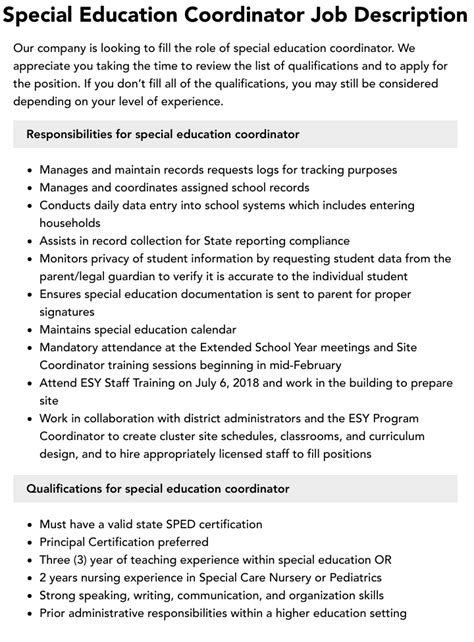Introduction

Special education coordinators play a pivotal role in ensuring that students with disabilities receive the support and services they need to succeed in school. These professionals work closely with teachers, administrators, and families to develop and implement individualized education programs (IEPs), coordinate therapy services, and advocate for the rights of students with disabilities.
Due to increasing demand for special education services, the job market for special ed coordinators is expected to grow significantly in the coming years. According to the U.S. Bureau of Labor Statistics, the median annual salary for special education coordinators is $63,540. The top 10% of earners make more than $93,000 per year.
What Does a Special Ed Coordinator Do?
The responsibilities of a special ed coordinator can vary depending on the size and needs of the school or district they work for. However, some of the most common duties include:
- Developing and implementing IEPs: Special ed coordinators work with teachers and parents to develop IEPs for students with disabilities. These plans outline the student’s unique needs and the services they will receive to help them succeed in school.
- Coordinating therapy services: Special ed coordinators often work with speech therapists, occupational therapists, and other professionals to provide therapy services to students with disabilities. They coordinate the schedules of these services and ensure that students are receiving the appropriate level of support.
- Advocating for the rights of students with disabilities: Special ed coordinators are advocates for the rights of students with disabilities. They work to ensure that students are treated fairly and have access to the same opportunities as their peers without disabilities.
What Skills and Qualifications Do You Need to Be a Special Ed Coordinator?
To be successful as a special ed coordinator, you will need the following skills and qualifications:
- A bachelor’s degree in special education or a related field
- A valid teaching license
- Experience working with students with disabilities
- Strong communication and interpersonal skills
- Ability to work independently and as part of a team
- Knowledge of federal and state special education laws
How to Find a Special Ed Coordinator Job
There are a number of different ways to find a special ed coordinator job. Some of the most common methods include:
- Searching for job openings online: There are a number of websites that list special ed coordinator job openings. Some of the most popular websites include Indeed.com, Monster.com, and CareerBuilder.com.
- Networking with other professionals: Attend conferences and other professional development events to meet other special ed coordinators and learn about job openings.
- Contacting schools and districts directly: Contact the human resources departments of schools and districts to inquire about job openings.
Conclusion
Special ed coordinator jobs are in high demand. If you have the skills and qualifications to be a successful special ed coordinator, you can have a rewarding career helping students with disabilities reach their full potential.
Table 1: Special Ed Coordinator Salaries by State
| State | Median Annual Salary |
|---|---|
| California | $78,000 |
| Florida | $65,000 |
| Illinois | $67,000 |
| New York | $72,000 |
| Texas | $64,000 |
Table 2: Special Ed Coordinator Job Outlook
| Year | Projected Job Growth |
|---|---|
| 2020 | 10% |
| 2025 | 12% |
| 2030 | 14% |
Table 3: Pros and Cons of Being a Special Ed Coordinator
Pros
- Rewarding work that makes a difference in the lives of students
- Opportunity to work with a diverse group of students and families
- Good job security
- Competitive salaries
Cons
- Can be stressful and demanding work
- Can be emotionally challenging to work with students who have severe disabilities
- May have to work long hours
Table 4: Tips for Writing a Strong Special Ed Coordinator Resume
- Highlight your experience working with students with disabilities.
- Quantify your accomplishments whenever possible.
- Use strong action verbs to describe your skills and experience.
- Tailor your resume to each job you apply for.
- Proofread your resume carefully before submitting it.
Frequently Asked Questions About Special Ed Coordinator Jobs
What is the difference between a special ed teacher and a special ed coordinator?
Special ed teachers provide direct instruction to students with disabilities. Special ed coordinators oversee the delivery of special education services within a school or district.
What are the career advancement opportunities for special ed coordinators?
Special ed coordinators can advance to positions such as assistant principal, principal, or director of special education.
Is it difficult to find a job as a special ed coordinator?
The job market for special ed coordinators is competitive, but there are a number of job openings available. To increase your chances of getting a job, you should have a strong resume and interview skills.
What is the most rewarding part of being a special ed coordinator?
The most rewarding part of being a special ed coordinator is seeing the progress that students with disabilities make. It is also rewarding to know that you are making a difference in the lives of these students and their families.
What is the most challenging part of being a special ed coordinator?
The most challenging part of being a special ed coordinator can be the paperwork and bureaucracy involved in the job. It can also be challenging to work with students who have severe disabilities.
What advice would you give to someone who is considering a career as a special ed coordinator?
If you are considering a career as a special ed coordinator, I would encourage you to do your research and learn as much as you can about the field. I would also recommend that you volunteer or work part-time with students with disabilities to get some hands-on experience.
